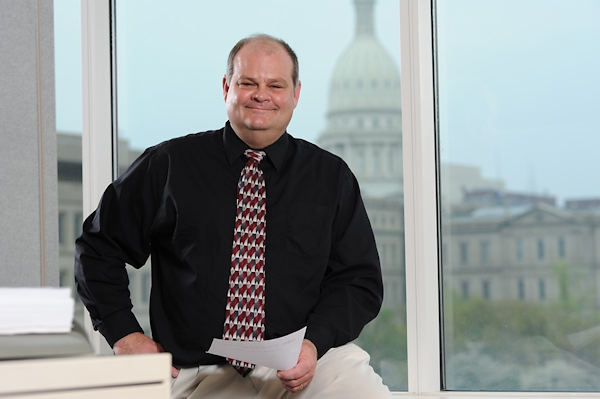A United Methodist pastor and engineer is on the scene in Flint, testing the water and praising God.
KARIN ORR
Michigan Area Communications
Most folks are familiar with modern-day superheroes like Wonder Woman or Batman. But maybe they are unaware of Flint’s “Water Man,” Bryce Feighner, the Reverend Bryce Feighner.
That’s right, Feighner, a water treatment specialist with a Master’s degree in Environmental Engineering, is also an Ordained Elder in the United Methodist Church. Currently serving as Special Advisor on Drinking Water to the Department of Environmental Quality (DEQ), he is also the part-time pastor of Gresham UMC in the Lansing District.
“I know I’m kind of an oddball in terms of pastoral ministry,” admits Feighner, age 59. “But this is my calling. Way back with my first call statement, I said I wanted to serve the government and the church as an environmental advisor. Despite its being an unusual combination, I believe my life has confirmed my calling.”
Now a lot of people are grateful Feighner continued to pursue this calling. As a key person dealing with the water crisis in Flint, Feighner, a licensed engineer, interprets technical water treatment information for a host of Federal, State, and local government agencies. He also works with the Governor’s Office, responding to media and legislative inquiries as well as questions from members of the greater community. “I try to make sure they get the technical details right,” Feighner explains.
However, Feighner admits the Flint Water Crisis is more than science and technology. “There are issues beyond this,” he says. “While help is available from government agencies, some residents refuse to accept this help due to trust issues.” This is an area where a group of eight local churches, supported by UMCOR, has been exceptionally helpful. “They don’t judge,” Feighner reports. “They don’t try to place blame; they just help, and as a result, they are able to serve some people government can’t reach.”
Feighner adds that if the public wants to help, contributions to agencies like UMCOR are more useful, at this point, than donations of bottled water. “The long-term response is going to be different,” he adds.
“Without water life would not exist. Our Creator,” Feighner muses, “surely must love water!”
“The water sampling results keep showing improvement, and that’s good. We know now that the water filters government agencies and the Church are providing are very effective, even at high lead levels.” Though the folks in Flint will eventually end up with a top-notch water system, they will still need filters in the foreseeable future, and filters cost money.
As Feighner reflects on his strenuous, seven-days-a-week work schedule, which has only recently eased up, he admits, “It’s been tough.” He is very grateful that his congregation has been gracious about the time he has spent dealing with the water crisis. He also looks forward to a long Memorial Day weekend and a summer camping trip with Gresham Church’s high school youth. “I told them we were going to be like Moses and the tribes of Israel, wandering in the desert without water,” he chuckles. “You know that Moses was the first water treatment specialist; he threw a tree into the bitter waters of Marah, in the Wilderness of Shur, and that made the water sweet!” (Exodus 15:22-25). “This is why I am working in Flint, to help make bitter waters sweet.”
Even in the way he structures his conversation, it is obvious that Bryce Feighner sees his two callings as uniquely integrated. “Environmental ethics and justice and stewardship are all one in my mind,” he avers. “There are many things necessary to human life—food, shelter—but water has a special, religious significance beyond science. Water is deliverance, salvation and life: “You saw your people as slaves but led them to freedom through the water of the Red Sea; You brought your children through the water of the Jordan River to the Promised Land; in the fullness of time Jesus was nurtured in the water of the womb.“
After this reference to the Church’s Baptismal liturgy, Feighner slips back into science: “Chemically, water is a miraculous substance: its polar nature makes it the universal solvent; our bodies are seventy per cent water; our earth’s surface is seventy per cent water—without water life would not exist. Our Creator,” Feighner muses, “surely must love water!”
From the satisfied tone in his voice, it is clear that Flint’s Water Man does, too.
Last Updated on May 24, 2016

